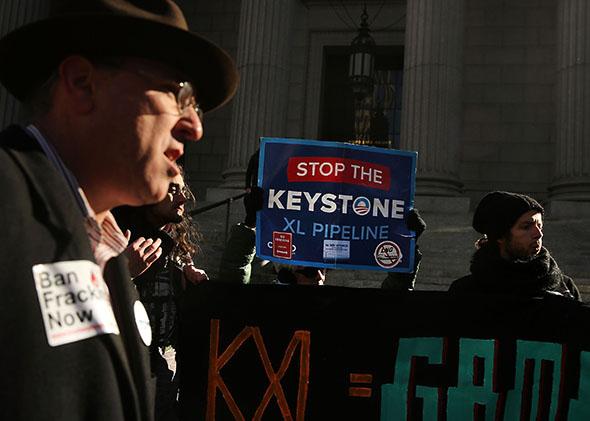Congressional Republicans remain on track for their first major legislative victory of 2015. The push to greenlight construction of the Keystone XL pipeline cleared its biggest procedural hurdle in the Senate on Monday, making its passage in the coming weeks all but inevitable. Republicans are in a win-win situation here: If the president signs the bill into law, the GOP can point to the pipeline as proof they’re delivering on their campaign promises. If Obama vetoes, he hands Republicans ammunition to argue ahead of 2016 that it’s the Democrats who are responsible for Washington’s gridlock. Either way, the new GOP-controlled Congress will be off to a running start.
But politics isn’t always the zero-sum game it’s made out to be. A Republican victory on Keystone won’t preclude the president from finding one of his own. To do that, though, Obama will need to finally say once and for all whether he thinks the pipeline should be built. That question has become a high-profile litmus test in the larger climate debate—one the president has gone to great lengths to avoid taking for the past six years and counting.
On the rare occasion Obama has spoken publicly about the 1,700-mile pipeline, he’s been careful to make his veto threat about the process, not the pipeline. He has maintained that the State Department simply needs more time to weigh the economic pros against the environmental cons of a project that would carry 830,000 barrels of carbon-heavy crude per day from Alberta’s oil sands to Gulf Coast refineries. That wait-and-see approach has left Obama in an awkward position—one that’s drawn fire from pipeline supporters and opponents alike—but has arguably proved to be politically beneficial to date. But now that Republicans have the votes to pass their fast-tracking bill, the president can’t afford to hide behind the bureaucratic red tape of his own creation any longer.
Pipeline opponents argue that the project would significantly accelerate the development of oil sands, one of the dirtiest fossil fuels on the planet. Industry groups and their more business-focused friends, meanwhile, can’t imagine putting climate concerns above the nation’s near-term economic and national security interests. They contend that the oil deposits will be exploited one way or the other, so the United States might as well get in on the action.
So what should Obama do once the Keystone bill reaches his desk? He could try to trade his approval of the project for something else on his environmental wish list. As the New Yorker’s Ryan Lizza has pointed out, the pipeline makes for the perfect bargaining chip for Obama: It’s a top priority for Republicans’ but toward the bottom of the president’s list of concerns. While Obama’s clearly not a fan of the project, he also appears skeptical of climate advocates’ doomsaying when it comes to the pipeline’s construction.
The president, then, could offer his signature in exchange for something that is squarely on his own climate radar, be it a large green infrastructure project or protecting his climate regulations, like the new limits on methane emissions from the oil and gas industry his administration is unveiling this week, or the carbon limits on existing coal- and gas-fired power plants the White House hopes to finalize this summer. Greenlighting the pipeline might enrage environmentalists who have questioned the president’s commitment to slowing climate change, but any short-term outrage would be a small price to pay to protect EPA rules that will have a much larger impact on global emissions than the pipeline ever could—rules that Republicans have made clear they plan to target this year. Such a move would also keep alive the sliver of hope that the president and congressional Republicans might be able to work together during the next two years.
The other option for Obama would be to stop hiding behind the State Department review and just say he won’t approve the pipeline on its merits alone. While the project would have only a marginal impact on global emissions, the president could make a forceful case that every little bit matters in the larger fight to combat man-made global warming. He could also argue that the pipeline likely won’t create nearly as many jobs as its backers claim, and point to the fact that the current economics of oil could make the project largely moot.
By the EPA’s own estimates, the tar sands oil that would pump through the pipeline would add 18.7 million additional metric tons of carbon to the atmosphere each year than would be produced by conventional oil—a sliver of the 5.5 billion tons the United States was responsible for in 2011, the most recent year for which we have comprehensive international data. In the grand scheme of carbon emissions, then, coming out against the pipeline would be a largely symbolic gesture in place of the more pragmatic and wonky efforts that Obama has tended to opt for when it comes to the climate. He’d be sending what amounts to a rallying cry to the environmentalists and their climate-conscious allies, one that would be greeted with cheers from the left heading into next year’s U.N. climate convention in Paris, where the president will have to convince other world leaders that the U.S. government does not think that global warming is a hoax, despite what they are hearing from GOP leaders in Congress. Using his executive authority to kill the pipeline would also make it clear that, finally freed from electoral politics, Obama is serious about using every tool he has to go it alone on the climate.
Neither option would cancel out the Republicans’ short-term political gains from their Keystone vote, but either would help the president cement his long-term environmental legacy. The only way Obama can fail to capitalize on the long game that he has been playing on Keystone is to continue to take bureaucratic cover. Doing that would waste a golden opportunity to turn a surefire short-term political loss into a long-term policy victory.
